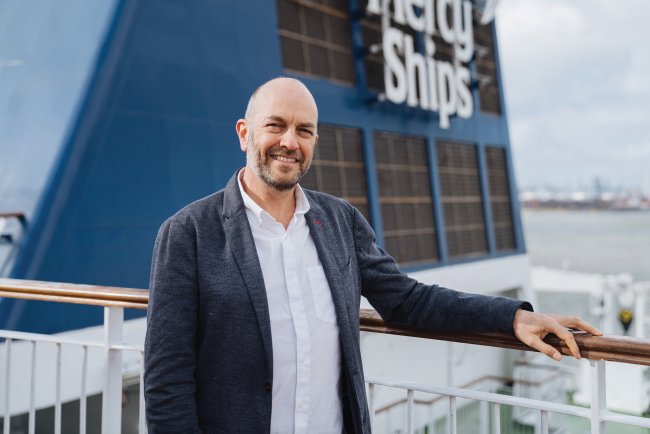Respiratory physician Lutz Beckert considers chronic obstructive pulmonary disease management, including the prevention of COPD, the importance of smoking cessation and pulmonary rehabilitation, and the lifesaving potential of addressing treatable traits. He also discusses the logic of inhaler therapy, moving from single therapy to dual and triple therapy when indicated, as well as other aspects of management
GP-turned-chaplain on mercy mission
GP-turned-chaplain on mercy mission

Here at New Zealand Doctor Rata Aotearoa we are on our summer break! While we're gone, check out Summer Hiatus: Stories we think deserve to be read again! This article was first published on 21 July 2022.
Chosen by Natasha Jojoa Burling: Andrew Clark started out as a Tauranga GP but is now looking after the mental wellbeing of staff on hospital ships that tour Africa giving free life-changing operations.
Newly commissioned hospital ship Global Mercy:
- is the world’s largest civilian hospital ship
- is 174m long and weighs 37,000 tonnes
- has 12 decks
- has a 7000sqm hospital with six operating rooms with 199-patient capacity, and seven intensive-care beds funded solely by donations from New Zealand
- provides radiology, rehabilitation and outpatient care
- has training spaces including a simulation lab with virtual and augmented reality
- has capacity for 641 crew
- can host up to 950 people, including local day crew, and
- has a student academy, auditorium, gym, cafe, shop, pool and library.
General practice taught me a lot about how to be someone who cares for other people
"It’s the toughest job you’ll ever love,” says Andrew Clark of volunteering for the floating hospital charity Mercy Ships.
Once a GP practising in Tauranga, Dr Clark is now international chaplain for the charity and interim senior chaplain on Global Mercy, the largest civilian hospital ship in the world.
The charity relies on volunteers for all its functions, including its main role – providing healthcare, including surgery, on board its vessels.
Volunteers are sponsored by friends, family, churches and former workmates. There’s a strong Kiwi connection, with New Zealanders per capita one of the largest volunteer pools for Mercy Ships.
Dr Clark’s association with the charity goes back to 1983 when he started donating money to it. He became interested while at Otago Medical School when he toured the organisation’s first ship, the Anastasis, during its visit to Dunedin.
South African by birth, he graduated in medicine from Otago in 1987 and first sailed aboard a Mercy Ship in 1991.
Dr Clark spent the 1990s working in general practice in Tauranga. A locum at first, he set up South City Medical Centre so he could work part time while volunteering for the charity. He sold the practice in 1998, then had a stint running a travel clinic in Tauranga.
In 2000, Dr Clark went to work on the Caribbean Mercy; he hasn’t lived in New Zealand since. He became managing director of that ship, then moved into organisational development at Mercy Ships headquarters in Texas, US.
Dr Clark says he used his people skills to work on team dynamics.
Now responsible for chaplaincy services on both ships, he’s in charge of member care, which involves looking after the emotional health of staff.
“It’s like the goose that laid the golden egg,” he says. His philosophy is that, if you want people to be productive, you must take care of them. That’s especially true on the ships, where people work and live together.
There are many overlaps between general practice and chaplaincy, Dr Clark says. Both roles require empathy and listening skills, and letting people know you care.
“Physiological and emotional pain are not too dissimilar,” says Dr Clark. He describes chaplaincy as being a GP without the medical aspect, saying: “General practice taught me a lot about how to be someone who cares for other people.”
Probing questions and diagnostic skills are often needed, he says, because many people will not disclose very much about their issues.
Chaplaincy has a spiritual aspect, and Dr Clark has always been interested in the whole person and how spirituality plays out and affects social relationships.
“When something goes wrong in someone’s life, it doesn’t just affect them, it affects their spouse, friends and family,” he says.
He adds that, if he had received better career counselling, he would have become a clinical psychologist.
The beginning of the COVID-19 pandemic was difficult for Mercy Ships volunteers. Early reports of the disease were dire, respirators were in short supply and the virus’ effects on postsurgical patients could be severe.
The Africa Mercy had 400 volunteers on board with a small intensive-care unit and very few respirators. With people working and living in close proximity, the risk of disease spread was high. The difficult decision was made to stop surgeries.
The ship took patients into port where they could be discharged or cared for. Mercy Ships arranged for as many of its volunteers as possible to be flown home.
The Africa Mercy berthed in the Canary Islands and waited in its own “bubble”, with crew allowed to walk down the gangway and throw rubbish off, but no one allowed to disembark.
The ship was one of the few places in the world where people didn’t have to wear masks, but was completely shut off for months.
Back at Texas at Mercy Ships HQ, Dr Clark was aware volunteers were experiencing anxiety as they waited aboard the ship, heard news of COVID around the world and felt trapped, unable to get home with the lack of flights. Some abruptly left their ship while serving.
That’s when Dr Clark carried out critical incident stress debriefing, a seven-phase, small-group crisis intervention process. Using video chat and Microsoft Teams, he also trained the chaplaincy team in the intervention.
As the world started to open up, the Africa Mercy could allow remaining team members and the crew who looked after them to go on leave, but others had to come and replace them.
New volunteers arrived and entered the ship’s bubble, effectively breaking it. Everyone on board then had to wear masks and a two-week quarantine was ordered for new arrivals.
Dr Clark says: “Introverts thought it was the greatest thing; extroverts were saying, ‘Get me out of here, I’m going insane’.” Regular COVID-19 testing began finding cases on board.
The virus became less virulent but Africa remained closed and Africa Mercy still could not take on patients.
The ship instead provided personal protective equipment to many countries. Mercy Ships helped fund vaccinations and sent surgeons into countries where it could.
Major work was also done on Africa Mercy to extend its life by 20 years.
The government of Senegal then wanted the ship’s team to carry out surgeries again.
The ship’s strict COVID protocols, testing, quarantine and masking helped ensure the volunteers could safely begin their work again.
Mercy Ships surgeries include: maxillofacial, including benign tumour removal, craniofacial tumours, and cleft lip and cleft palate; paediatric, congenital and adult cataracts; burns and plastics reconstruction; paediatric orthopaedics; women’s health (mainly obstetric fistula reconstruction); hernias; goitres; club foot; and dental.
The organisation’s new vessel, Global Mercy, was built in China over the pandemic’s first two years and sailed to Europe for outfitting before being commissioned at the port of Dakar in Senegal last month.
Mercy Ships expects to more than double the impact of its work with the new ship, both with life-changing operations and providing medical training to locals.
Dr Clark says that, unlike Africa Mercy, Global Mercy was purpose-built as a hospital ship. It’s expected to last for 50 years and serve the African continent well.
He says many people believe Africa’s worst health problem is HIV/AIDS, malaria or tuberculosis but, in fact, it is the lack of access to safe, affordable and timely surgery. The issue is the lack of resources such as operating theatres, intensive care and trained staff. Solving this would pour billions into Africa’s gross domestic product.
In Africa, many people with a disability are ostracised, ridiculed and accused of dabbling in witchcraft, Dr Clark says. Having surgery enables people to take a seat at the table of humanity again and has a positive effect on their family and community.
Mercy Ships volunteers train nurses, surgeons, anaesthetists, sterilisers and biomedical staff. That is what leaves a lasting impact, says Dr Clark: “It’s all about medical capacity building.”
Mercy Ships is a faith-based organisation that uses hospital ships to deliver free healthcare services, capacity building, and sustainable development to the developing world. Founded in 1978 by Don and Deyon Stephens, the organisation has worked in more than 55 developing countries, providing services worth more than $2.5 billion and directly benefiting more than 2.8 million people. The charity’s two ships, Global Mercy and Africa Mercy, are crewed by volunteers from over 60 nations, with an average of 1200-plus volunteers each year. They include surgeons, dentists, nurses, healthcare trainers, teachers, cooks, seafarers, engineers and agriculturists. Mercy Ships has 16 national offices and an Africa Bureau.
We're publishing this article as a FREE READ so it is FREE to read and EASY to share more widely. Please support us and the hard work of our journalists by clicking here and subscribing to our publication and website






![Barbara Fountain, editor of New Zealand Doctor Rata Aotearoa, and Paul Hutchison, GP and senior medical clinician at Tāmaki Health [Image: Simon Maude]](/sites/default/files/styles/thumbnail_cropped_100/public/2025-03/Barbara%20Fountain%2C%20editor%20of%20New%20Zealand%20Doctor%20Rata%20Aotearoa%2C%20and%20Paul%20Hutchison%2C%20GP%20and%20senior%20medical%20clinician%20at%20T%C4%81maki%20Health%20CR%20Simon%20Maude.jpg?itok=-HbQ1EYA)
![Lori Peters, NP and advanced health improvement practitioner at Mahitahi Hauora, and Jasper Nacilla, NP at The Terrace Medical Centre in Wellington [Image: Simon Maude]](/sites/default/files/styles/thumbnail_cropped_100/public/2025-03/2.%20Lori%20Peters%2C%20NP%20and%20advanced%20HIP%20at%20Mahitahi%20Hauora%2C%20and%20Jasper%20Nacilla%2C%20NP%20at%20The%20Terrace%20Medical%20Centre%20in%20Wellington%20CR%20Simon%20Maude.jpg?itok=sUfbsSF1)
![Ministry of Social Development health and disability coordinator Liz Williams, regional health advisors Mary Mojel and Larah Takarangi, and health and disability coordinators Rebecca Staunton and Myint Than Htut [Image: Simon Maude]](/sites/default/files/styles/thumbnail_cropped_100/public/2025-03/3.%20Ministry%20of%20Social%20Development%27s%20Liz%20Williams%2C%20Mary%20Mojel%2C%20Larah%20Takarangi%2C%20Rebecca%20Staunton%20and%20Myint%20Than%20Htut%20CR%20Simon%20Maude.jpg?itok=9ceOujzC)
![Locum GP Helen Fisher, with Te Kuiti Medical Centre NP Bridget Woodney [Image: Simon Maude]](/sites/default/files/styles/thumbnail_cropped_100/public/2025-03/4.%20Locum%20GP%20Helen%20Fisher%2C%20with%20Te%20Kuiti%20Medical%20Centre%20NP%20Bridget%20Woodney%20CR%20Simon%20Maude.jpg?itok=TJeODetm)
![Ruby Faulkner, GPEP2, with David Small, GPEP3 from The Doctors Greenmeadows in Napier [Image: Simon Maude]](/sites/default/files/styles/thumbnail_cropped_100/public/2025-03/5.%20Ruby%20Faulkner%2C%20GPEP2%2C%20with%20David%20Small%2C%20GPEP3%20from%20The%20Doctors%20Greenmeadows%20in%20Napier%20CR%20Simon%20Maude.jpg?itok=B0u4wsIs)
![Rochelle Langton and Libby Thomas, marketing advisors at the Medical Protection Society [Image: Simon Maude]](/sites/default/files/styles/thumbnail_cropped_100/public/2025-03/6.%20Rochelle%20Langton%20and%20Libby%20Thomas%2C%20marketing%20advisors%20at%20the%20Medical%20Protection%20Society%20CR%20Simon%20Maude.jpg?itok=r52_Cf74)
![Specialist GP Lucy Gibberd, medical advisor at MPS, and Zara Bolam, urgent-care specialist at The Nest Health Centre in Inglewood [Image: Simon Maude]](/sites/default/files/styles/thumbnail_cropped_100/public/2025-03/7.%20Specialist%20GP%20Lucy%20Gibberd%2C%20medical%20advisor%20at%20MPS%2C%20and%20Zara%20Bolam%2C%20urgent-care%20specialist%20at%20The%20Nest%20Health%20Centre%20in%20Inglewood%20CR%20Simon%20Maude.jpg?itok=z8eVoBU3)
![Olivia Blackmore and Trudee Sharp, NPs at Gore Health Centre, and Gaylene Hastie, NP at Queenstown Medical Centre [Image: Simon Maude]](/sites/default/files/styles/thumbnail_cropped_100/public/2025-03/8.%20Olivia%20Blackmore%20and%20Trudee%20Sharp%2C%20NPs%20at%20Gore%20Health%20Centre%2C%20and%20Gaylene%20Hastie%2C%20NP%20at%20Queenstown%20Medical%20Centre%20CR%20Simon%20Maude.jpg?itok=Z6u9d0XH)
![Mary Toloa, specialist GP at Porirua and Union Community Health Service in Wellington, Mara Coler, clinical pharmacist at Tū Ora Compass Health, and Bhavna Mistry, specialist GP at Porirua and Union Community Health Service [Image: Simon Maude]](/sites/default/files/styles/thumbnail_cropped_100/public/2025-03/9.%20Mary%20Toloa%2C%20Porirua%20and%20Union%20Community%20Health%20Service%20in%20Wellington%2C%20Mara%20Coler%2C%20T%C5%AB%20Ora%20Compass%20Health%2C%20and%20Bhavna%20Mistry%2C%20PUCHS%20CR%20Simon%20Maude.jpg?itok=kpChr0cc)